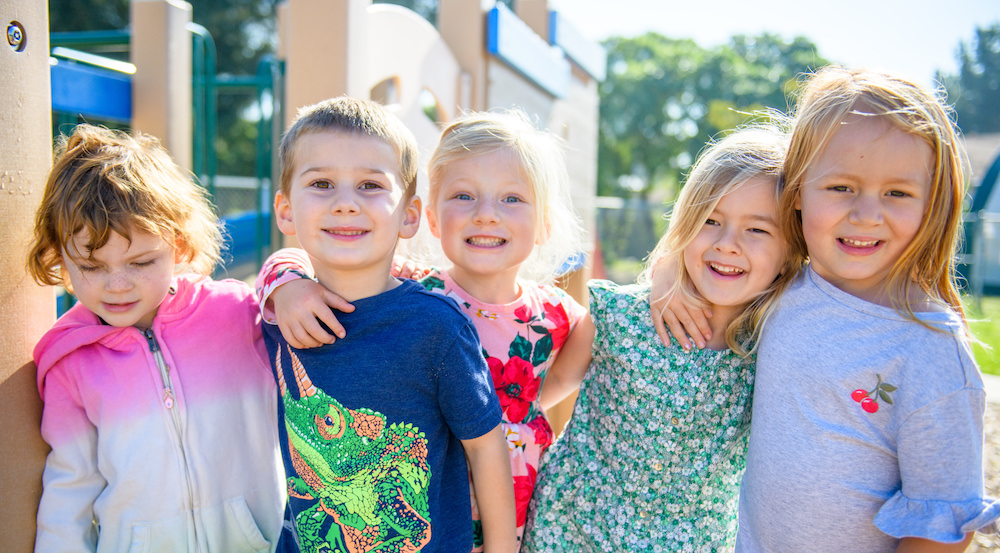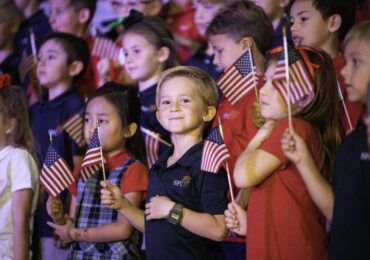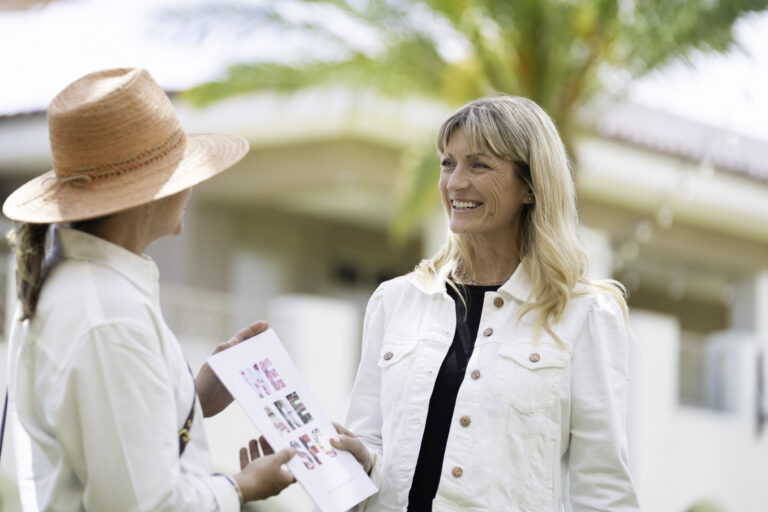Episode Show Notes
In this episode, Mike sits down with Elementary School Principal, Hannah Park, and Assistant Principal, Amanda Walker to talk about what kindergarten readiness looks like and how you can determine your child is ready for kindergarten.
Mike Siciliano, High School Dean of Students, has a long history with Sante Fe Christian, sitting in several roles including alumnus, US history teacher, and football coach. As a student, Siciliano felt he had teachers and coaches who personally invested in him and made a huge difference in his life. Now, he tries every day to continue that legacy for current SFC students, live up to the standard his teachers set for him, and have a lot of fun.
Hannah Park, Elementary School Principal, is in her ninth year as principal at SFC. With an MA in Education Administration and Curriculum Design, a BS in Public Administration plus California Administration and Multi-Subject Teaching credentials, Mrs. Park is well prepared to lead SFC’s Elementary School. She was also an Assistant Principal at a prep school and has taught in all grades K–6 in both public and private schools. During her tenure, SFC’s Elementary School was awarded the Exemplary High Performing National Blue Ribbon School by the US Department of Education for 2011, a five-year designation.
Amanda Walker, Assistant Principal of SFC’s Elementary School, holds a BA from Santa Clara University, a teaching credential from California State University San Marcos, and an MA in Educational Administration from Point Loma Nazarene University. After holding a leadership position in children’s ministry, Amanda launched her teaching career as a first and fourth-grade teacher prior to coming to SFC in 2006. She is a San Diego native and a proud mom of three amazing children.
Highlights
00:00:00 – Introductions
00:02:17 – Factors of kindergarten readiness
00:03:34 – Academic readiness
00:06:07 – Physical readiness
00:07:42 – Social readiness
00:08:35 – Emotional competence
00:09:04 – Santa Fe Christian developmental readiness assessment
00:11:49 – What do you do if your child isn’t ready for kindergarten?
00:20:09 – Why you shouldn’t prepare your child to pass the assessment
Transcript
Mike Siciliano [00:00:04] Welcome back to another episode of our Eagle Perspective podcast. I’m Mike Siciliano, Dean of Students for the High School. Today we are going to talk, actually, about kindergarten readiness. When do you know that your child is ready for kindergarten, what does that look like, and all of the questions that go along with that. I’m joined today by two of our most beloved staff members and experts in this area, our Elementary School Principal and Assistant Principal, Hannah Park, and Amanda Walker. Hannah and Amanda, thank you so much for joining us today.
Hannah Park [00:00:37] Oh, thank you for having us.
Amanda Walker [00:00:39] Great to be here.
Mike Siciliano [00:00:39] So, why don’t we start? Actually, if you guys just want to introduce yourself briefly and talk about how long you’ve been with the school and how you came to education.
Hannah Park [00:00:47] All right. So, this is Hannah. This is my 14th year at Santa Fe Christian. I came here after teaching in the public school system for several years, and then at an independent school, and after that went into the administration field. This is truly a very special place. I love it. Both my kids graduated from Santa Fe, and we’re a fan.
Amanda Walker [00:01:14] I’m Amanda Walker, and I have been here for 15 years at Santa Fe and taught for several years before coming to Santa Fe at a different private school. Also, love Santa Fe. I actually have my three children here at the moment, spanning Elementary School through Middle School. So, kindergarten and kindergarten readiness is something I’m familiar with, from both the teacher administrator side and parent side of things.
Mike Siciliano [00:01:44] And full disclosure for our listeners. So, we all have or have had students come through Santa Fe. In fact, correct me if I’m wrong, Hannah. You have two daughters who graduated from Santa Fe.
Hannah Park [00:01:56] Correct.
Mike Siciliano [00:01:56] And Amanda, you have three students here.
Amanda Walker [00:01:59] Yes.
Mike Siciliano [00:02:00] Correct? Who have all gone through kindergarten.
Amanda Walker [00:02:02] Yep.
Mike Siciliano [00:02:02] I have one in the kindergarten currently, and I will listen to your expert evaluation of whether she was actually ready or not. Everything you say, I’m just going to be taking notes for my daughter just to make sure.
Amanda Walker [00:02:16] Yeah, it’s a good checklist.
Mike Siciliano [00:02:17] Yeah. So, I know we have a lot of people listening who probably have a toddler, maybe a four-year-old, three-year-old, maybe someone who just turned five, and they’re wondering, “How do I know if my child is ready?” I know, just going through this recently, it’s like, “My kid’s turning five. I guess I sign them up for kindergarten.” But you had some comments and things you share that helped us really actually figure out, “Is that something we should do?” So, what are some things parents should be looking for in determining if this is the year to start?
Hannah Park [00:02:47] What’s really interesting is for so many schools, age really is the only determining factor for kindergarten readiness. That’s the only thing they’re looking at is the age. Are they five by September first? Well, it’s… We know it’s way more than that. Age is one factor, but so much more goes into it. So, we can break it down into different categories. Being ready for kindergarten means having well-developed preschool skills, and being academically, socially, and physically ready for this transition is really what we’re looking for. So, should we go down that list?
Mike Siciliano [00:03:31] Yeah, that sounds great. Let’s go through those one at a time. That’d be awesome.
Hannah Park [00:03:34] Well, let’s start with academic readiness, since it is a school, after all. So, coming into kindergarten… and this will be a little different based on the schools that you’re interested in. So, I’ll speak from the perspective of Santa Fe and what we’re looking for, but certainly, this could be applied to lots of other schools. We’re looking for students who are ready to learn. Now, what does that mean? Are they interested in learning? Are they interested when you’re reading aloud to them? Are they wanting to participate? And so, a lot of this, you will have to really take note of what the preschool teachers are telling you as a parent. If the students do not have well-developed preschool skills, they’re not ready for kindergarten. Yet, sometimes students, just because they did two years of preschool, it must be time for a move on to kindergarten. And sometimes that’s not the best decision. So, for kindergarten academic readiness, Amanda, do you want to just share some of the skills?
Amanda Walker [00:04:38] Yeah. So, some things that you could be looking at for determining if your child is academically ready for kindergarten are things like can they retell a simple story? Are they speaking in complete sentences with five to six words? Are they writing or at least recognizing the letters in their own name, matching rhyming sounds, able to understand the concept of opposites? I say hot; they’ll say cold. Can they recite the alphabet or count to 10? So, these are just some basic parameters for academic readiness. If any of those things seem to be something that your child is not yet ready to do, then it might not be the time for them to come to kindergarten. They might benefit from another year of preschool, where those skills will be solidified.
Mike Siciliano [00:05:28] So, that’s really helpful. And just from a parent standpoint, you listed off a whole bunch of things. It’s really if they can do most of those things, right? They don’t have to be perfect at it. If they get five out of the six opposites and miss one, it’s not, “Oh, they missed that one. They’re not ready.”
Amanda Walker [00:05:45] Correct, because that’s really showing that they are understanding the concept of opposites, even if they’re not getting every single connection there.
Mike Siciliano [00:05:55] Right. And I remember you actually have an assessment that you can give that helps parents understand or learn how well their kids are familiar with these things. Is that correct?
Hannah Park [00:06:07] Yeah. So, for our kindergarten readiness, we do assess the students. And we are looking at their academic and physical. So, fine motor and gross motor skills are part of the academic skill, but it’s also physical. And this is actually quite important. And we are seeing children with less developed fine motor skills as they play more on iPads and computer games. So, we really want to encourage families to continue having their kids play with Legos. And those little Barbie shoes are awesome to try to put on, and developing those little fine motor skills is quite important — how to hold a pencil, how to hold a crayon. Drawing and coloring with a marker is very different than using a crayon because of how slippery a marker is versus how gritty the crayon is. So, all those different materials that they will use, it’s quite important. Outside of that, we do rely heavily on the recommendation from their current preschool teachers to see if they’re also emotionally and socially ready. And all of that paint a nice, little picture of the sweet little kid that’s about to enter.
Mike Siciliano [00:07:35] Right. Maybe let’s touch on those other criteria, as well. As far as emotional and social, what are other signs of readiness?
Hannah Park [00:07:42] Social is another huge component because they do a lot of parallel playing, where they’re playing together physically. But oftentimes, you may have kids not interacting as much, which is perfectly fine at the preschool level. But once you start entering kindergarten, that will transition. So, can they work together with someone else? Can they share? Can they wait? That delayed gratification is a huge component. Can you wait without having a tantrum? Can you give up something, even when it’s unfair? That’s huge, and I think that’s something that, actually, we’re all struggling with.
Mike Siciliano [00:08:24] I was going to say you just hit on the thing that made me question my daughter’s readiness for kindergarten.
Hannah Park [00:08:31] Yeah, but that really… It’s the emotional competence, right?
Amanda Walker [00:08:35] Some other things to look for: does your child ask for help when they need it, because that’s a big factor, too. There’s a lot of things they can do independently, but are they able to speak up, self-advocate a little bit for themselves?
Mike Siciliano [00:08:50] Okay, so, I know that you also give prospective parents to Santa Fe Christian an assessment that helps them understand their students’ skills and gives them some ideas of how well their children are doing in each of these areas. Is that correct?
Amanda Walker [00:09:04] Yes. Yeah, we do. We use… It’s a developmental readiness assessment, actually. So, it is measuring a little snapshot of a bunch of these different things. Not as much the social piece, although a little bit with our observations that are done during the testing period because it’s done one-on-one with a proctor. So, they are just noticing if the child’s saying, “I don’t know, I don’t know,” “I can’t,” “I haven’t learned that” a lot or if they’re just ready to just jump in and give it all a try, even though there may be things that they don’t know, which is expected and totally fine.
Mike Siciliano [00:09:42] Right.
Amanda Walker [00:09:42] And it has seven different categories: visual motor, personal skills, concepts, body image, language, numbers, fine motor, and gross motor.
Mike Siciliano [00:09:54] And I know from experience that sometimes you get some fun answers on that assessment.
Amanda Walker [00:09:58] We get some really fun answers. It’s our favorite thing to look over, actually.
Hannah Park [00:10:04] In fact, some of the little drawings that they do for us, we save it, and then we give it back to them when they graduate out of fifth grade. It’s so cute.
Amanda Walker [00:10:15] Yeah.
Mike Siciliano [00:10:16] So, I remember last year when my daughter took it, one of the questions, I think, was, “What would you do if a stranger came up to you and asked you to follow them somewhere?” And I think my daughter’s response was, “I would tell them I already have a family.”
Hannah Parker [00:10:34] Yes.
Amanda Walker [00:10:35] Good.
Hannah Parker [00:10:35] Which is very good.
Mike Siciliano [00:10:36] I was proud of that.
Amanda Walker [00:10:38] Yeah.
Hannah Park [00:10:38] Right? And some of these questions… So, that’s all under the personal skills section, where we’re trying to find out if the child is aware of how to care for themselves. We would ask them simple things. I don’t want to give away all our industry secrets here.
Mike Siciliano [00:10:59] No cheating the assessments, parents. No cheating.
Amanda Walker [00:11:01] No cheating.
Hannah Park [00:11:02] No, no, no. It’s all good. But if a child… “If you see fire, what are you going to do?” It’s a very simple, basic question. And based on that, you can gauge well, are they aware that something like that is dangerous? So, that’s what we’re assessing with some of these skills. And then, of course, like Amanda mentioned, the visual motor and fine motor, those are another huge component. And concepts. Are they ready for school concepts? Do you understand before and after? Amanda mentioned about the opposites, as well, but even concepts of color and things like that. Small, large.
Mike Siciliano [00:11:49] Right. So, I imagine a lot of parents that are listening right now are going through the checklist in their head and trying to determine, “Okay, is my kid ready or not?” And so, there’s a couple things that may come out of that for them. So, number one, let’s say they’re not ready. What do you do? What do you do? That might be a hard realization for some parents to have. What’s your recommendation if that’s the case?
Hannah Park [00:12:15] It’s actually a huge gift of time. I know that at the moment, you were so set on your child entering kindergarten, and it can feel devastating to hear that they’re not ready. All it means is that they just need another year of growth. So, truly give them that gift of time. Go do another year of preschool. And if the preschool has a transitional preschool, bonus preschool, then that would be a perfect spot for that child to just develop some of these basic academic as well as social skills and really hone in on them.
Mike Siciliano [00:12:53] So, what about for families whose child has not actually been to preschool?
Hannah Park [00:12:57] And we do have families who come from being homeschooled. And again, these skills, they still have to continue to help their child develop these skills. So, the academic skills, I would suggest that the mother or whoever is helping the child with these skills get those simple books to start with letter writing, geometric shapes, coloring, all the preschool, pre-reading, pre-math skills. They should be working on that as well as… I’m sure the child is then involved in other social activities. Right now, given the whole situation with COVID, it’s a little trickier. But certainly, creating a small social event, or doing gymnastics, or doing some other activities that the child might be interested in is absolutely important. Also, let them play. You got to allow the child to play and develop the independence. So, this, actually, is probably harder for families who are homeschooling because, at a preschool, that is something that they’re really working on. But allowing students to become independent is a huge factor. I know that, sometimes… Hey, I had two little ones at one point, and you’re late; you need to run out the door. “Come on, let me just put that jacket on you. Let me zip it up, and let’s get in the car and go,” but they can put on their jacket; they can put on their shoes. And so, allowing the children to have these independent times is, I think, very, very important.
Mike Siciliano [00:14:41] On the flip side, there is increasing pressure to get kids started early to… I think parents feel like, “I don’t want my kid to fall behind.” So, why is it important to wait if they’re not ready as opposed to, “Well, we’ll put them in there, and they’ll catch up to everybody else, and it’ll be good for him to get a head start”?
Amanda Walker [00:15:01] Yeah, you can understand the pressure that parents feel when it comes to these decisions. But I would encourage parents to think outside of the kindergarten year. When they start out… If they start, and they’re the youngest one in the class, they’re not just going to be the youngest in the class in kindergarten; they’re going to be the youngest in the class when they get to sixth grade, and then when they get to high school, and everyone drives ahead of them, and then they go off to college as the youngest. So, it’s a lifetime decision in that aspect. So, if they’re ready emotionally, socially, physically, academically, and that just happens to be they’re going to be on the younger side, it will not be a problem, not a problem. But if they are not ready — and so, they’re not quite ready socially, emotionally, physically, or academically in any aspect — then that is going to progress with them. Those are the times where we often have a conversation about them doing another year of kindergarten, because just maturity-wise, they’re just not where the other students are at. And that’s not their fault. That’s nothing they can do anything about. There’s no studying or extra tutoring to be done for that. They really do just need more time. So, that’s why we encourage those families where those types of things show up, maybe in the developmental readiness assessment, or feedback from preschool teachers, or observations. We encourage those parents to just consider having them do another year at preschool because it will really benefit. It’s in the best interest of the child.
Hannah Park [00:16:46] Every year we speak with parents who regret not having taken that time when they were in preschool or kindergarten. We’ve never had a parent tell me… In my years of experience, I’ve never had a parent tell me that I regretted having my child wait a year. That gift of time is so helpful for kids who just need it. And like Amanda said, if you’re ready, it won’t be a problem. You can be the youngest child. We had a student who started very young, but she was absolutely ready in all of those categories. And she’s actually, I think, a junior or senior year, and she’s doing amazingly well. So, when the student is ready, then everybody knows.
Amanda Walker [00:17:34] So, personally, when it came to deciding when my children were ready for kindergarten, my middle son, he was a summer birthday. And not just because of his age, honestly, but just where he was at socially and academically, his interest in school and his desire to be independent was a little bit less. He really, really loved his days at home still, and he just wasn’t ready for a full five day a week kindergarten. We could just tell that for him. So, we made the decision to wait a year. So, he actually started kindergarten at six years old, having just turned six years old. And it has proved to be the best decision for him, absolutely. He is thriving. And then when it came to our third, I assumed that we would actually do the same. Again, we were blessed with a summer baby. So, I was thinking that we would wait again until six years to send to kindergarten because that had worked out so well. But yet no. Very, very ready socially, maybe especially socially, but academically, emotionally, everything, so ready to start kindergarten at five. And that has also proved to be absolutely the right decision. So, within your family, things might be different. Well, it will be. Every child is very, very unique. So, you just have to look at each one individually, separately from each other. It won’t all be the same. And I think, too, we want children to love learning and love coming to school. And so, if their starting point is a little bit bumpy, where they start to feel like, “I’m behind; I’m not finishing my work like the other kids are,” we don’t want that to be their internal dialogue that they feel about school. We want them to come in and feel positive and successful. And they’re all going to have their various struggles along the way, where things are hard, and that’s okay. But to have your school experience start off, we want it to be as positive as possible.
Mike Siciliano [00:19:44] Yeah. Well, I can say that my daughter is having an amazingly positive experience. So, I’m grateful to both of you and the whole team down there for what you guys are doing with kindergarten and the whole Elementary School.
Amanda Walker [00:19:55] Aww. Thank you. We love her.
Hannah Park [00:19:56] Yeah.
Amanda Walker [00:19:59] She makes me smile every day.
Mike Siciliano [00:20:00] That’s good. That’s good. Apparently, she behaves much better on campus than she does at home.
Amanda Walker [00:20:06] That is true of most children.
Hannah Park [00:20:07] Everybody.
Mike Siciliano [00:20:09] And I’m just teasing. She’s wonderful. We love her to death. So, what would you say? Because I know, being a parent myself, and I hear about a test or criteria, I want to… There’s part of me that wants to go prep my kid a little bit and make sure that… How do I train them to be ready? What would you say to that instinct in parents to try to prepare their student as well as possible for kindergarten in terms of passing an assessment?
Hannah Park [00:20:37] I would say, “Please don’t.” I actually would say that SFC… Well, at Santa Fe, we are trying to determine what the child already knows, and your readiness skill isn’t this long laundry list of can you get these questions right or wrong, but have you had enough life experience that allows you to be able to function in a kindergarten classroom? So, some of the questions that we would ask, it really is related to the life experience they’ve had and the conversations they would normally have with their parents. And that develops their view of the world; that develops their vocabulary; it develops their concepts, understanding of number sense. And, really, that’s what we’re looking for. So, I wouldn’t encourage families to go out and do anything specific to prep for an assessment. I know the word “assessment” is quite loaded. And we hear about college SAT prep or things like that, but in terms of kindergarten readiness, it really is if your child is ready, there’s nothing for you to do, nothing you have to do. They’ll be ready. The only thing academic that we would always encourage is for families to keep reading with their children, lots of read-alouds, and practice the fine motor skills. So, when they’re picking up a pencil… Now, don’t force it on them. When they’re ready, allow them to start writing, and help them with the pencil grip. But I would not go and do anything specific to help prep.
Mike Siciliano [00:22:25] It almost sounds to me what you’re saying is the best preparation is just having a relationship with your child on a daily basis.
Hannah Park [00:22:32] Absolutely.
Mike Siciliano [00:22:33] Going through normal life, and letting them develop, and coaching them as they’re growing up.
Hannah Park [00:22:39] Exactly. Yep. Yeah. Well, allow them to help you prep in the kitchen; allow them to be part of the family life; have them put their dirty laundry away. All of these skills are what develop into later on the other skills that they will need to be successful in a school. They already probably have many of these skills, and that’s really what we’re looking for.
Mike Siciliano [00:23:07] Well, you had me at help them put their dirty laundry away. I’m in for that.
Hannah Park [00:23:13] Absolutely. Yeah.
Mike Siciliano [00:23:15] Well, thank you both for being here on this episode. Some really helpful information for parents who are just on the front end of this school journey. And I just can’t say thank you enough for sharing your wisdom and your experience with us.
Hannah Park and Amanda Walker [00:23:29] Well, thank you for having us.
Mike Siciliano [00: 23:31] All right. This has been another episode of Eagle Perspective. Please check out our other episodes on our website, sfcs.net. And we look forward to being with you again soon.







